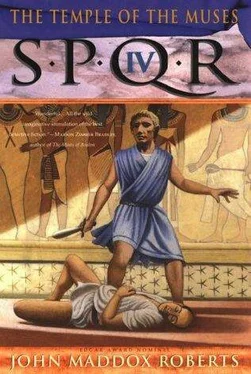John Roberts - Temple Of Muses
Здесь есть возможность читать онлайн «John Roberts - Temple Of Muses» весь текст электронной книги совершенно бесплатно (целиком полную версию без сокращений). В некоторых случаях можно слушать аудио, скачать через торрент в формате fb2 и присутствует краткое содержание. Жанр: Исторический детектив, на английском языке. Описание произведения, (предисловие) а так же отзывы посетителей доступны на портале библиотеки ЛибКат.
- Название:Temple Of Muses
- Автор:
- Жанр:
- Год:неизвестен
- ISBN:нет данных
- Рейтинг книги:5 / 5. Голосов: 1
-
Избранное:Добавить в избранное
- Отзывы:
-
Ваша оценка:
- 100
- 1
- 2
- 3
- 4
- 5
Temple Of Muses: краткое содержание, описание и аннотация
Предлагаем к чтению аннотацию, описание, краткое содержание или предисловие (зависит от того, что написал сам автор книги «Temple Of Muses»). Если вы не нашли необходимую информацию о книге — напишите в комментариях, мы постараемся отыскать её.
Temple Of Muses — читать онлайн бесплатно полную книгу (весь текст) целиком
Ниже представлен текст книги, разбитый по страницам. Система сохранения места последней прочитанной страницы, позволяет с удобством читать онлайн бесплатно книгу «Temple Of Muses», без необходимости каждый раз заново искать на чём Вы остановились. Поставьте закладку, и сможете в любой момент перейти на страницу, на которой закончили чтение.
Интервал:
Закладка:
"Just so," Iphicrates said through gritted teeth.
"But, learned Iphicrates," Julia said hastily, "what other marvelous works occupy your mind? In your books you have said that you always have a number of projects under study at any time."
"If you will come this way," he said, ushering us into a spacious room adjoining the courtyard where the workmen assembled his water gate. The room was full of cupboards and tables, and the tables were littered with models in varying stages of assembly. Most of the machines, as he explained them, had something to do with raising weights or water. I pointed at one that displayed a long, counterweighted arm tipped with a sling.
"A catapult?" I inquired.
"No, I never design engines of war. That is an improved crane for lifting great stones. A number of your Roman engineers have shown interest in it. It will prove most helpful in your great bridge and aqueduct projects."
While he spoke to Julia and the Librarian, I wandered about the room, admiring his amazingly lucid drawings and diagrams, every one of them applying geometry and mathematics to the accomplishment of some specific task. This was a sort of philosophy that I could appreciate, even if I found the man himself odious. The open cupboards were filled with more papyri and scrolls. On one table was an oversized scroll of dark, oiled olive wood, its handles stained vermilion. Even a glance told me that it was not made of Egyptian papyrus, but of the skin-paper of Pergamum. I picked up the massive scroll and began to unroll it, but Iphicrates made a massive, throat-clearing sound.
"Excuse me, Senator," he said, hastily taking it from my hands. "This is the unfinished work of a colleague, lent to me on the understanding that no one else should see it until he has finished it and made it public." As he locked the thing in an ornate cupboard, I wondered what sort of colleague would trust Iphicrates of Chios with anything.
"That scroll reminds me," Julia said, adroitly smoothing things over. "I have yet to see the famous Library. And who better to show it to me than the Librarian himself?" We bade farewell to the difficult mathematician and received his churlish goodbyes in return.
I had already toured the Library, and once you have seen one tremendous warehouse of books, you have seen them all. Besides, it was a noisy place, with hundreds of scholars reading at the top of their lungs. Romans read at a polite, dignified murmur, but not Greeks or, worse, Asiatics. I left Julia and Amphytrion to the dubious pleasures of the Library while I idled about in the great outer courtyard, admiring the splendid statues. I had been there no more than a few minutes when my slave Hermes appeared bearing the most welcome of sights: a bulging wineskin and a pair of cups. I had left him with our litter with strict orders to stay where he was. Naturally, he had ignored me. He was an unregenerate young criminal, but he made up for it by anticipating my needs with mystical precision.
"Didn't think you'd be able to take too much culture at once," he said, pouring me a cup. "I went out to a wineshop and picked us up some first-rate Lesbian."
I took the cup gratefully. "Remind me to flog you sometime for disobedience." I raised the cup in toast to the statue of Sappho that stood just inside the portico of the Temple. She had this place of honor because the old Greeks had named her "the tenth Muse." I took a long drink and addressed the statue.
"Now I know what your inspiration was, old girl." The many tourists made scandalized noises to see someone drinking in such a place. That was all right. A Roman Senator can do whatever he likes, and we're used to snooty foreigners calling us barbarians. Hermes poured himself a cup.
"I trust you have some valuable information for me," I said. "There are limits to the insolence I will tolerate."
"I got this straight from the queen's personal maids," he assured me. "She's pregnant again." This was one of the ways that Hermes served me.
"Another royal brat!" I said. "This is going to complicate things, especially if it turns out to be a boy. Another princess won't matter much, with three already underfoot."
"They say Pothinus, the Number One Eunuch, is not pleased." Hermes was privy to more privileged information than the whole diplomatic corps.
"No reason why he should be. It just complicates his life, too. Not to mention that eunuchs as a rule don't take much satisfaction in human fertility. How far along is she?"
"Three months. Berenice is furious, Cleopatra seems to be happy about it and Arsinoe's too young to care. As far as I know, young Ptolemy hasn't been told yet."
"What about the king?" I asked.
"I don't move in such exalted circles. You're the great Roman official."
"Much good does that do me. I'm a glorified tour guide these days."
"At least you're in agreeable company. Would you rather be in Rome, dodging Clodius and being poisoned by his sister and worrying about what Caesar has planned for you? Enjoy the vacation, is what I say."
"Hermes," I said, "here we stand in the midst of the greatest assemblage of philosophers in the world. I don't need your worldly advice."
He snorted. "I've seen plenty of these philosophers since we've been here. You know why they all have slaves to wipe their bottoms for them? Because they're too crackbrained to do it for themselves."
"You shouldn't speak that way of your betters." I tossed him the empty cup. "Take this back to the litter. That skin had better not be noticeably flatter when we leave here."
Still at loose ends, I went into the Temple itself. I had never visited the Temple, and so I was completely unprepared for its breathtaking beauty. It was circular, thus giving equal place to each of the nine Muses, whose statues stood around its periphery.
In Rome we had our fine Temple of Hercules and the Nine Muses, but there the pride of place is given to Hercules, a Roman favorite. The images of the Muses are not of the highest quality.
These were worthy of Praxiteles. They were carved from the finest white marble, adorned with only the subtlest tints, unlike so many garishly painted statues. This gave them a spectral, almost transparent presence, like spirits seen in a dream. Before each burned a vessel of frankincense, wreathing them in smoke and contributing to their divine appearance. Only their eyes, delicately inlaid with shell and lapis lazuli, shone forth with more than mortal intensity.
I realized then how little I knew of the Muses. I daresay I could have named two or three of them: Terpsichore, because everyone likes dance, and Polyhymnia, because we all sing praises of the gods, and Erato, because she is the Muse of love poems and her name is similar to Eros. But the others were hazy to me.
The proportions of the Temple were perfect. It was not numbingly huge like so many of the Alexandrian buildings, but rather of human scale. The statues of the Muses were only slightly larger than life-size, just enough to emphasize that these were not mere mortals. The polished marble of which it was built was of many colors, but all of it pale, accentuating the aetherial nature of the place.
Outside of Rome, I have encountered only a few temples, shrines or sanctuaries that seemed to me genuinely holy. Alexandria's Temple of the Muses was one of them. Being there was like falling under the spell of the sublime goddesses.
"You like our Temple, Senator?" I turned to see a small, bearded man dressed in a simple white, Dorian chiton and a hair-fillet of plain white cloth.
"It is sublime," I said in a low voice. To speak loudly in this place would be a desecration. "I want to sacrifice to them."
He smiled gently. "Here we do not sacrifice. On their festivals, we offer the goddesses wheat kneaded with honey, and we pour libations of milk and honey and water, that is all. We burn incense to their honor. They are not deities who love the blood of sacrifice. Here we work to their glory."
Читать дальшеИнтервал:
Закладка:
Похожие книги на «Temple Of Muses»
Представляем Вашему вниманию похожие книги на «Temple Of Muses» списком для выбора. Мы отобрали схожую по названию и смыслу литературу в надежде предоставить читателям больше вариантов отыскать новые, интересные, ещё непрочитанные произведения.
Обсуждение, отзывы о книге «Temple Of Muses» и просто собственные мнения читателей. Оставьте ваши комментарии, напишите, что Вы думаете о произведении, его смысле или главных героях. Укажите что конкретно понравилось, а что нет, и почему Вы так считаете.









